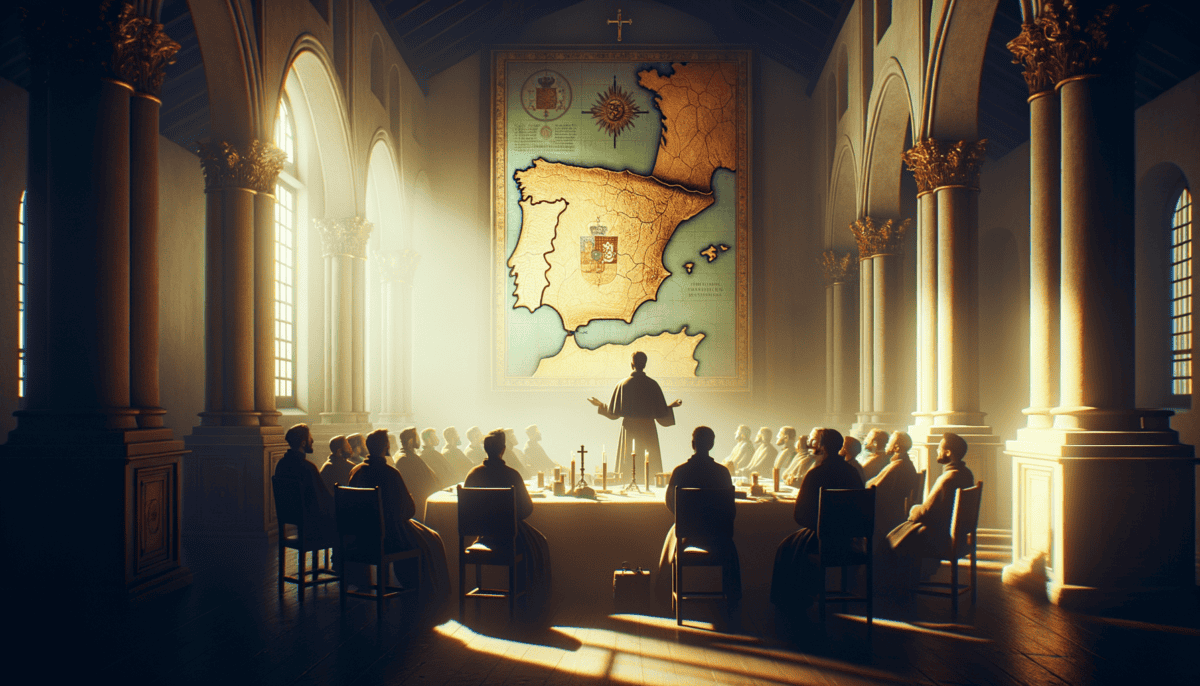The Spark of Vision
On a sunny morning in 1928, young Josemaría Escrivá walked through the busy streets of Madrid. He was a regular priest, just like many others in Spain. But this day would change everything.
The bells of the church rang loudly. Josemaría stopped and looked up at the sky. He felt something special in his heart. It was like a tiny seed of an idea starting to grow.
"God wants something different," he whispered to himself. "Something new."
Little Josemaría had always been different. While other kids played games, he liked to help people. His mom and dad taught him to be kind and to pray. But he wanted to do more.
"Mama," young Josemaría once said, "why do people think they can only be holy in church?"
His mother smiled. "What do you mean, mi hijo?"
"I see good people everywhere. The baker who gives bread to poor families. The teacher who stays late to help students. Aren't they doing God's work too?"
A New Way of Thinking
Spain in the 1920s was a place of big changes. Some people were rich, but many were poor. Some went to church every day, while others never went at all.
Josemaría had an idea that would surprise everyone. He thought:
• You don't have to be a priest or nun to be holy
• Regular people can be special too
• Even doing homework or cleaning can be a way to show love for God
“God can be found in everyday life, in the simple things we do,” Josemaría would tell people.
One day, while walking in the snow ❄️, he saw footprints. They made him think about how each person leaves their mark in the world. That's when he knew what to do.
He would start something new. A group that would help regular people find God in their everyday lives. He would call it “Opus Dei” – God’s Work.
But it wouldn't be easy. Some people laughed at his ideas. Others said he was wrong. But Josemaría kept believing in his special mission.
He started small. He talked to students and workers. He told them they could be special just by doing their regular jobs well. Many people liked this idea.
"So I can be holy just by being a good teacher?" a young woman asked.
"Yes!" Josemaría smiled. "By teaching with love and care, you're doing God's work."
Spain was going through hard times. There were fights between different groups. Some churches were closed. But Josemaría didn't give up. He knew his idea was important.
He wrote in his diary: "Everyone can be special in their own way. A doctor helping sick people, a mom taking care of her kids, a student studying hard – all of this can be holy work."
More and more people started listening. They liked how Josemaría made complicated things simple. He showed them that being good wasn't just for special people – it was for everyone!
As the sun set over Madrid that evening, Josemaría looked at the city lights coming on. He knew this was just the beginning. His small idea would grow into something much bigger than he could imagine.
Seeds of a Movement
The warm Spanish sun peeked through the window as Father Josemaría sat with his first group of followers. It was 1930, and his tiny seed of an idea was starting to grow!
Around a simple wooden table sat five young students. They listened closely as Josemaría spoke about his dream of making everyday life holy.
“But Father,” asked Pedro, one of the students, “how can studying math be holy work?”
Josemaría smiled. “When you study hard and help others learn, you’re doing what God wants. That makes it special!”
Hard Times and Brave Hearts
Soon, dark clouds came over Spain. It was 1936, and a big war started – the Spanish Civil War. Many churches closed. Some priests had to hide.
Josemaría had to be very brave. He wore regular clothes instead of his priest clothes to stay safe. He moved from house to house, helping people in secret.
“Even in hard times, we can find ways to do good,” he told his friends. “Sometimes being brave is the holiest thing we can do.”
But not everyone liked his ideas. Some old-fashioned church people said:
• “Regular people can’t be as holy as priests!”
But Josemaría knew better. He kept teaching his simple message: everyone can be special by doing their everyday work with love.
Growing Bigger
After the war ended, more people wanted to join. Students, teachers, doctors, and workers – they all liked the idea that their jobs could be holy work!
“Maria,” Josemaría said to a young teacher, “when you help your students with patience and love, you’re doing God’s work.”
“Really?” Maria’s eyes lit up. “Even when I’m just teaching ABC’s?”
“Especially then!” he smiled. “Every small thing can be big in God’s eyes.”
The group started small study centers where people could learn and pray together. They were like little families, helping each other become better.
New Ways to Share
Josemaría wrote little books and letters to help people understand his ideas better. He used simple words so everyone could understand.
“Remember,” he would say, “a mother cooking dinner with love is just as holy as a priest saying prayers.”
More and more people joined. They started groups in different cities. Each person helped spread the message in their own way:
A doctor would talk to other doctors about making their work holy.
A teacher would show other teachers how to teach with extra love.
A student would help friends see how studying could be special.
Sometimes people would ask Josemaría if his idea was too simple. He would just smile and say, “The best things in life are simple. Like love. Like helping others. Like doing your best in everything.”
The sun was setting on another busy day in Madrid. Josemaría looked at his growing family of followers. His tiny seed had grown into a strong young tree. But this was still just the beginning of something much bigger.
Rise to Influence
The year was 1946, and Opus Dei was ready to grow beyond Spain! Father Josemaría packed his bags and headed to Rome, the home of the Catholic Church.
“Look at this big city,” Josemaría told his friend Álvaro. “Soon people here will learn about our special way of being holy too!”
Making New Friends
In Rome, Josemaría met many important church leaders. Some became good friends who helped Opus Dei grow.
“Your ideas are just what the Church needs,” said Cardinal Giovanni, smiling warmly. “Regular people need to know they can be holy too!”
“God’s love is for everyone,” Josemaría would say. “Not just for priests and nuns!”
Growing Around the World
Like a happy family getting bigger, Opus Dei started growing in new places:
• Portugal made friends with Opus Dei in 1945
• England said hello in 1946
• Ireland and France joined in 1947
• Mexico and United States welcomed them in 1949
• And many more countries after that!
Every new country meant new friends learning about making their work holy. Teachers, doctors, builders, and moms – they all joined the happy family!
Special Help from Friends
Some members of Opus Dei became very good at their jobs. They helped make the group stronger:
Antonio was a smart teacher who helped start new schools.
Maria helped other women see how special their work was.
José worked with newspapers to tell people about Opus Dei.
Learning and Growing
Opus Dei started many schools and study centers. They wanted to help people learn and grow smarter and kinder.
“When we learn,” Josemaría would tell students, “we can help more people and do more good things!”
The centers were like happy homes where people could study, pray, and make friends.
Working with Leaders
Some Opus Dei members became helpers to important people. They showed how to make good choices and help others.
“Remember,” Josemaría would say, “being important means helping more people, not just being powerful.”
Making Big Plans
Josemaría and his friends made plans to help even more people. They wanted to:
Build new schools to help kids learn
Start hospitals to help sick people
Make places where poor people could learn jobs ️
One evening in Rome, Josemaría looked out his window at the sunset. The tiny seed he planted in Spain had grown into a big tree with branches all over the world! But there were still many more people to help and teach.
“God’s love is like the sun,” he told a friend. “It shines everywhere and makes everything it touches beautiful.”
The stars began to twinkle over Rome. Tomorrow would bring new friends, new places, and new ways to make the world a little bit better.
Whispers and Shadows
As Opus Dei grew bigger and stronger, not everyone was happy. Some people started asking questions and telling stories.
Secret Stories
“They have secret meetings!” whispered some people. “They don’t tell us what they do!”
Maria, an Opus Dei member, would smile and say, “We just pray and work hard. That’s our only secret!”
“We’re like a family that loves God. Families don’t tell everyone everything, but that doesn’t make them bad!”
Newspaper Stories
Sometimes, newspapers would write scary stories about Opus Dei:
• They said the group had too much power
• They worried about their special rules
• They didn’t like that some things were private
• They thought the group was too strict
But many members like Carlos would say, “Come visit us! See for yourself how we live and work!”
Different Ways of Thinking
Inside Opus Dei, some members had different ideas too:
“Maybe we should tell people more about what we do,” said Juan.
“But some things are special, just for our family,” said Ana.
“We can find a good middle way,” suggested Father Pedro.
Books and Movies
Some writers wrote books and movies about Opus Dei. Some were nice, some were not so nice.
“It’s okay,” Father James would tell worried members. “People sometimes don’t understand things that are different.”
The best way to show the truth was to keep doing good things and helping others.
Making Things Better
Opus Dei leaders worked hard to help people understand better:
They made websites to explain things clearly
They invited people to visit their centers
They showed how they helped poor people
They shared happy stories about their work
Learning from Problems
Every big family has problems sometimes. Opus Dei learned from theirs:
“We can be more open,” said Rosa. ️
“We can explain things better,” added Miguel.
“We can show more love to everyone,” smiled Teresa. ❤️
One evening, at an Opus Dei center in New York, Sofia was talking to some visitors. “We’re not perfect,” she said, “but we try our best to make God happy and help others.”
Outside, the city lights twinkled like stars. Sometimes shadows made things look scary, but when you turned on the light, you could see things weren’t scary at all. They were just different, and different can be good!
The next day would bring new chances to show people the truth about their special family in the Church.
Growing Around the World
The sun rises over different cities each day, and Opus Dei grows like a big tree with branches reaching everywhere!
New Places, New Friends
Maria packed her small bag in Spain. “I’m going to help start a new center in Brazil!” she said with a big smile.
“God’s love is for everyone, everywhere. That’s why we travel far and wide!”
Schools and Learning
Opus Dei opened special schools where kids could learn:
In Africa, children ran happy to their new classroom.
In Asia, students learned about computers and God.
In America, teachers helped kids be kind and smart.
Helping Everyone
Opus Dei members found new ways to help people:
• They built hospitals for sick people
• They made farms to grow food
• They taught people new jobs
• They helped families stay happy
Carlos smiled as he taught farmers better ways to grow food. “When we help others, we make God happy!”
Modern Changes
The world changed a lot, and Opus Dei changed too:
“We can use phones to share God’s love,” said Juan.
“Our website helps people learn about us,” added Ana.
“Social media connects us with young people,” smiled Pedro.
Big Family Growing
Every day, new people joined the Opus Dei family:
Sarah from Kenya loved helping at the hospital.
Miguel from Mexico taught kids to read.
Lisa from Japan prayed while working in her office.
Everyone found their own special way to serve God.
Happy Together
In a big meeting room in Rome, people from all over the world gathered:
“Look how different we all are!” laughed Teresa.
“But we’re one big family,” smiled Robert.
“God’s love brings us together,” nodded Maria. ❤️
As the sun set in Rome, members shared stories from their countries. Some spoke different languages, but everyone understood the language of love and kindness.
Tomorrow would bring more chances to grow, more people to help, and more ways to share God’s love around the world. The big tree of Opus Dei kept growing stronger, with roots of faith and branches of hope reaching to every corner of Earth.
A Light for Tomorrow
The morning sun streams through stained glass windows at Opus Dei’s main center in Rome. Today is special – members from all over the world have come to plan the future!
Looking Back with Joy
Old photos line the walls. Father Josemaría smiles from black and white pictures. His dream grew into something amazing!
“Remember how it started?” Maria asks softly. “Just one priest with a big dream.”
“Now look at us!” Carlos grins. “We’re everywhere, helping people just like he wanted!”
New Dreams Growing
Young members share their hopes:
Sofia wants to build more schools
James plans new ways to help poor families
Anna dreams of hospitals in far places
“Every day is a chance to make the world better with God’s love!”
Facing Big Challenges
The world changes fast, but Opus Dei stays strong:
• Finding new ways to reach young people
• Helping families stay happy
• Teaching about God’s love in fun ways
• Using technology to connect everyone
Love That Never Ends
In the garden, members pray together:
“Thank you, God, for Father Josemaría’s dream,” whispers Teresa.
“Help us share your love with everyone,” adds Miguel. ❤️
“Guide us to help more people,” Maria says softly.
Tomorrow’s Promise
As stars twinkle above Rome, everyone feels happy and excited. The future looks bright! ⭐
“Our work isn’t done,” says Carlos. “It’s just beginning!”
The old building glows with warmth as members head home. Each person carries a piece of Father Josemaría’s dream in their heart. Tomorrow brings new chances to share God’s love!
Around the world, Opus Dei members smile, knowing they’re part of something special. Like stars in the night sky, they shine God’s light everywhere. The story that started with one priest’s vision now touches millions of hearts – and it keeps growing, one kind act at a time.






